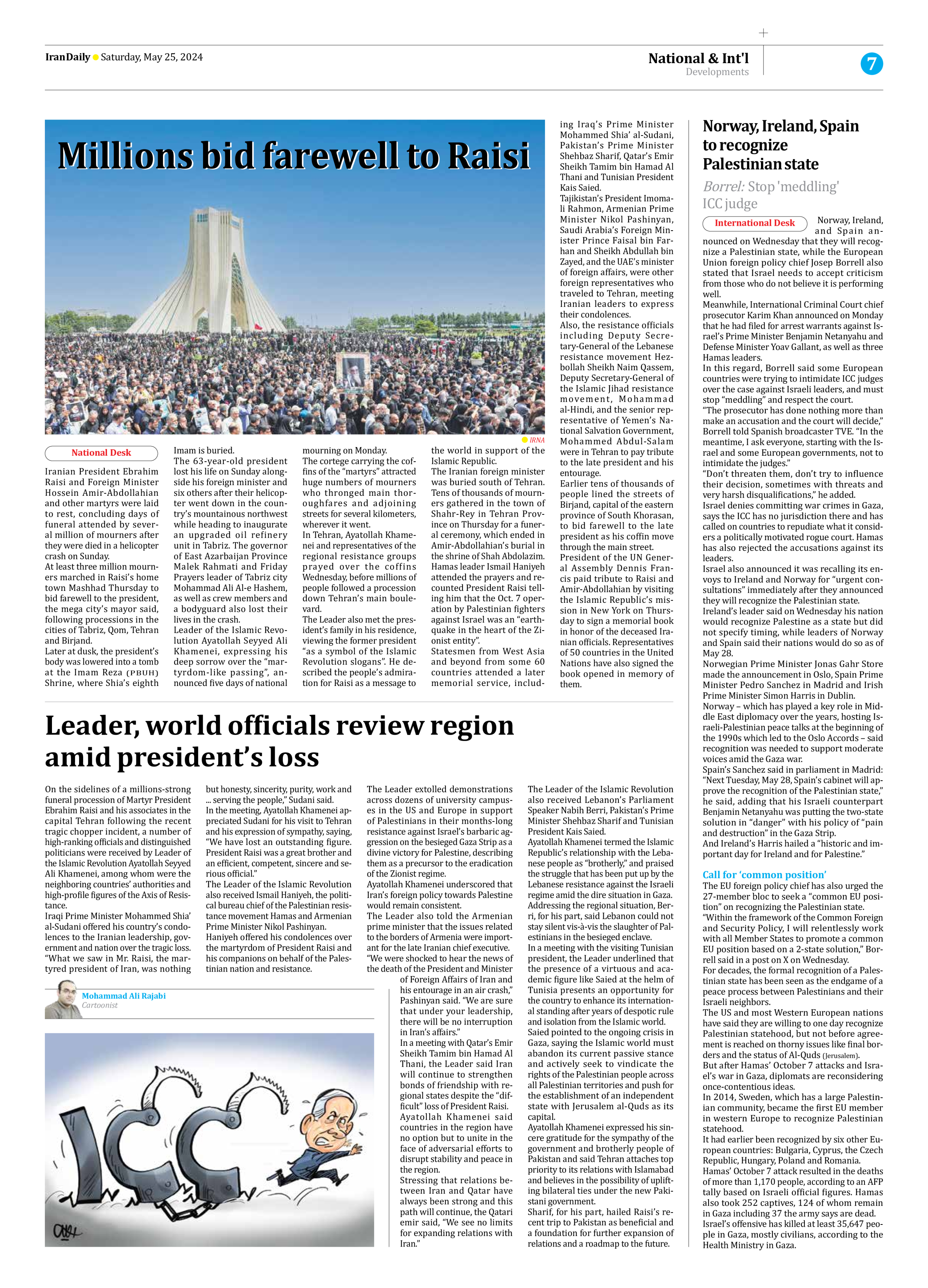
Copy in clipboard...
Leader, world officials review region amid president’s loss
Iraqi Prime Minister Mohammed Shia’ al-Sudani offered his country’s condolences to the Iranian leadership, government and nation over the tragic loss.
“What we saw in Mr. Raisi, the martyred president of Iran, was nothing but honesty, sincerity, purity, work and ... serving the people,” Sudani said.
In the meeting, Ayatollah Khamenei appreciated Sudani for his visit to Tehran and his expression of sympathy, saying, “We have lost an outstanding figure. President Raisi was a great brother and an efficient, competent, sincere and serious official.”
The Leader of the Islamic Revolution also received Ismail Haniyeh, the political bureau chief of the Palestinian resistance movement Hamas and Armenian Prime Minister Nikol Pashinyan.
Haniyeh offered his condolences over the martyrdom of President Raisi and his companions on behalf of the Palestinian nation and resistance.
The Leader extolled demonstrations across dozens of university campuses in the US and Europe in support of Palestinians in their months-long resistance against Israel’s barbaric aggression on the besieged Gaza Strip as a divine victory for Palestine, describing them as a precursor to the eradication of the Zionist regime.
Ayatollah Khamenei underscored that Iran’s foreign policy towards Palestine would remain consistent.
The Leader also told the Armenian prime minister that the issues related to the borders of Armenia were important for the late Iranian chief executive.
“We were shocked to hear the news of the death of the President and Minister of Foreign Affairs of Iran and his entourage in an air crash,” Pashinyan said. “We are sure that under your leadership, there will be no interruption in Iran’s affairs.”
In a meeting with Qatar’s Emir Sheikh Tamim bin Hamad Al Thani, the Leader said Iran will continue to strengthen bonds of friendship with regional states despite the “difficult” loss of President Raisi.
Ayatollah Khamenei said countries in the region have no option but to unite in the face of adversarial efforts to disrupt stability and peace in the region.
Stressing that relations between Iran and Qatar have always been strong and this path will continue, the Qatari emir said, “We see no limits for expanding relations with Iran.”
The Leader of the Islamic Revolution also received Lebanon’s Parliament Speaker Nabih Berri, Pakistan’s Prime Minister Shehbaz Sharif and Tunisian President Kais Saied.
Ayatollah Khamenei termed the Islamic Republic’s relationship with the Lebanese people as “brotherly,” and praised the struggle that has been put up by the Lebanese resistance against the Israeli regime amid the dire situation in Gaza.
Addressing the regional situation, Berri, for his part, said Lebanon could not stay silent vis-à-vis the slaughter of Palestinians in the besieged enclave.
In a meeting with the visiting Tunisian president, the Leader underlined that the presence of a virtuous and academic figure like Saied at the helm of Tunisia presents an opportunity for the country to enhance its international standing after years of despotic rule and isolation from the Islamic world.
Saied pointed to the ongoing crisis in Gaza, saying the Islamic world must abandon its current passive stance and actively seek to vindicate the rights of the Palestinian people across all Palestinian territories and push for the establishment of an independent state with Jerusalem al-Quds as its capital.
Ayatollah Khamenei expressed his sincere gratitude for the sympathy of the government and brotherly people of Pakistan and said Tehran attaches top priority to its relations with Islamabad and believes in the possibility of uplifting bilateral ties under the new Pakistani government.
Sharif, for his part, hailed Raisi’s recent trip to Pakistan as beneficial and a foundation for further expansion of relations and a roadmap to the future.







